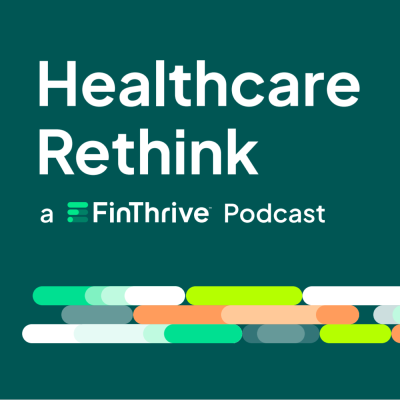
Healthcare Rethink
Podcast by FinThrive
This podcast is free to listen on all podcast players and the Podimo App without a subscription.
All episodes
107 episodesExploring Price Transparency and Healthcare Solutions with Dr. Jonathan Kaplan In an enlightening episode of the Healthcare Rethink podcast, hosted by Jonathan Wick, VP of Health Insights at FinThrive, Dr. Jonathan Kaplan, a pioneer in the medical field, shares revolutionary insights into the realm of healthcare transparency and e-commerce. Delving into the transformative journey from traditional medical practices to innovative health solutions, Dr. Kaplan discusses the inception and evolution of his platform, BuildMyHealth, which has significantly simplified the healthcare process for both providers and consumers. The Shift Towards Transparent Healthcare Dr. Kaplan highlights the challenges and breakthroughs in creating a transparent healthcare system where patients can directly understand and predict medical costs. Through BuildMyHealth, he introduced a model where potential patients could receive instant price estimates, leading to informed decisions and a smoother healthcare experience. This initiative not only enhances patient engagement but also serves as a lead generation tool for healthcare providers. Innovative Solutions in Medical E-Commerce Moving beyond mere price estimation, Dr. Kaplan's platform has matured into an e-commerce hub, allowing patients to purchase non-surgical treatments and even manage subscriptions for routine medical needs like Botox or weight management treatments. This e-commerce capability marries convenience with medical care, setting a new standard in healthcare consumer engagement and retention. Fostering Provider-Patient Relationships through Technology Addressing the impersonal nature of direct-to-consumer medical platforms, Dr. Kaplan emphasizes the importance of maintaining a provider-patient relationship. His platform, now rebranded to Dr. Well by BuildMyHealth, ensures that while consumers enjoy the ease of online interactions, they still benefit from ongoing support and guidance from their trusted healthcare providers. Conclusion and Call to Action This episode of Healthcare Rethink not only sheds light on Dr. Kaplan’s contributions to enhancing price transparency in healthcare but also underscores the potential for technology to streamline and humanize patient care. To hear more about how Dr. Kaplan is revolutionizing healthcare practices, tune into the podcast and join the movement towards a more transparent and patient-centric healthcare system. Subscribe to our channel for more insights and discussions with leaders in healthcare innovation.
In the most recent episode of the "Rethink Healthcare" podcast, presented by FinThrive, Rory Boyd, Revenue Cycle Manager at Scripps, shared insights into how his organization uses innovative programs to retain and develop their frontline healthcare staff. With 13 years of experience at Scripps, Rory carries numerous experiences, from construction to healthcare, and aids in crafting a thriving healthcare environment. Kicked off with a friendly banter about football and baseball preferences, the conversation took an insightful turn as Rory unveiled his journey at Scripps and his dedication to revolutionizing patient access & quality. Boyd's career at Scripps has been diverse, having joined as a part-time medical assistant, then climbing up through various roles, and ultimately landing in the access quality program. Innovative Staff Programs at Scripps Arguably the most inspiring part of the conversation was Boyd's narration of the patient experience ambassador course and a revenue cycle leadership development program. In these programs, the best access staff members get trained and developed into ambassadors, contributing not only to the staff's personal growth but also to the broader organizational objectives. Worth noting is that though hundreds might start the program, typically only six to eight graduates, emphasizing the course's rigor and the value placed on earning the title of an ambassador. Creating a Culture of Learning Rory emphasized the organization's focus on creating a "culture of learning," indicating how Scripps has partnered with Healthcare Business Insight (HBI) and implemented mandatory monthly learning modules on various topics for all access staff members, ranging from Medicare as a Secondary Payer to improving registration accuracy. These strategic training and development initiatives have notably led to a significant reduction in registration errors and authorization-related denials. Employee Satisfaction and Retention The podcast also highlights the importance of maintaining employee satisfaction and retention in a high-turnover industry like healthcare. Investment in employees, demonstrated through continuous learning and development initiatives, not only helps keep them satisfied but also leads to improved organizational productivity and service delivery. Rory shared that 40% of the participants, post their training experience, have moved up within the organization, serving as testament to the program’s success. Key Takeaway In conclusion, the podcast shines a light on how investing in staff development and creating an enriching work environment can lead to greater job satisfaction, improved performance, and staff retention. By focusing on staff learning and growth, organizations could potentially create an upward spiral of productivity and service quality, ultimately leading to better patient care and satisfaction. A Final Note Rory concluded his conversation by emphasizing the importance of self-reflection as a leader. He advised fellow leaders to review their work daily and ask themselves if they have made their organization proud. He suggested this consistent self-reflection often leads to improved work ethic and increased commitment to organizational goals and standards. This advice undoubtedly aligns with FinThrive's mission to optimize operations in the healthcare industry through thoughtful planning and goal setting.
Medical school taught Dr. Robert Lufkin the conventional wisdom of the healthcare system, but his experiences and research exposed deeper issues at play. In this episode of Healthcare Rethink, hosted by Brian Urban, the spotlight shines on Dr. Robert Lufkin, MD, the author of Lies I Taught in Medical School. The conversation centers around the flaws in traditional medical education and how it shapes the healthcare landscape today. Dr. Lufkin discusses how medical school shaped his early beliefs and how those teachings now contribute to many chronic diseases that plague patients. Dr. Lufkin’s book examines the "lies" taught in medical school, particularly the outdated methods of treating chronic diseases like diabetes, cardiovascular disease, and obesity. He explains how the traditional Western medical approach, often reliant on pills and surgery, is insufficient in addressing the root causes of these conditions. Instead, the focus must shift toward lifestyle changes and holistic health. Throughout the discussion, Dr. Lufkin provides actionable insights for medical professionals and patients looking to take charge of their health. He hopes to reshape medical education for the next generation, offering a more comprehensive approach to preventing chronic diseases. This episode offers a compelling perspective for those curious about how medical school education has evolved and what changes are necessary for a healthier future.
Revolutionizing drug development is pivotal in today’s healthcare landscape, particularly as the patient voice grows louder and more influential in shaping therapies. The latest episode of Healthcare Rethink, a FinThrive podcast, looks at this transformative trend. In an engaging discussion, host Brian Urban welcomes Wendy Erler, the VP of Global Patient Experience at Alexion and AstraZeneca, to explore the increasingly critical role of patient insights in drug development. Erler brings a unique perspective, having transitioned from a career in sales to a focus on patient advocacy, significantly impacting how drugs are developed and brought to market. The conversation highlights Erler’s journey through various healthcare and pharmaceutical roles, leading to her current focus on rare disease communities. These groups are more than beneficiaries of drugs but also active participants in drug research and development, often driving the funding and direction of studies. Erler emphasizes that revolutionizing drug development today requires an ecosystem approach, where patients, caregivers, and families are integral to the conversation from the outset. Erler and Urban discuss the balance between drug affordability and accessibility, a challenge that spans U.S. and global healthcare systems. Erler advocates for transparency and inclusivity in these discussions, ensuring patient experiences significantly influence drug development strategies. The dialogue extends into innovative partnerships and projects at AstraZeneca, where the integration of patient advocacy throughout the drug development process is ethical and strategic, ensuring that therapies are effective and aligned with patient needs.
As artificial intelligence (AI) weaves deeper into various sectors, AI in healthcare is experiencing a transformation that promises both challenges and groundbreaking advancements. This episode of “Healthcare Rethink,” a FinThrive podcast, dives into AI’s current state and future in healthcare. In this episode, host Brian Urban engages with Bobby Samuels, CEO at Protege, to discuss the profound impact of AI across the healthcare ecosystem. They explore emerging trends such as AI in radiology and automated insurance coding, addressing the potential and the hurdles of integrating AI within healthcare practices. From discussing real-world applications to theoretical frameworks, this conversation illuminates the path forward for AI-enhanced healthcare solutions. Further into their conversation, Samuels elaborates on the nuances of AI applications in healthcare, mainly focusing on data privacy and the ethical use of AI. He underscores the need for stringent de-identification processes to ensure patient data remains confidential while being utilized to train AI models. Moreover, Samuels and Urban delve into the societal implications of AI, discussing the importance of ensuring that AI technologies are equitable and do not perpetuate existing biases, especially in diagnostic and treatment decisions. This discussion reveals the careful balance between leveraging AI for its full potential while safeguarding against its inherent risks.
Available everywhere
Listen to Podimo on your phone, tablet, computer or car!
A universe of audio entertainment
Thousands of audiobooks and exclusive podcasts
No ads
Don't waste time listening to ad breaks when listening to Podimo's content.



















